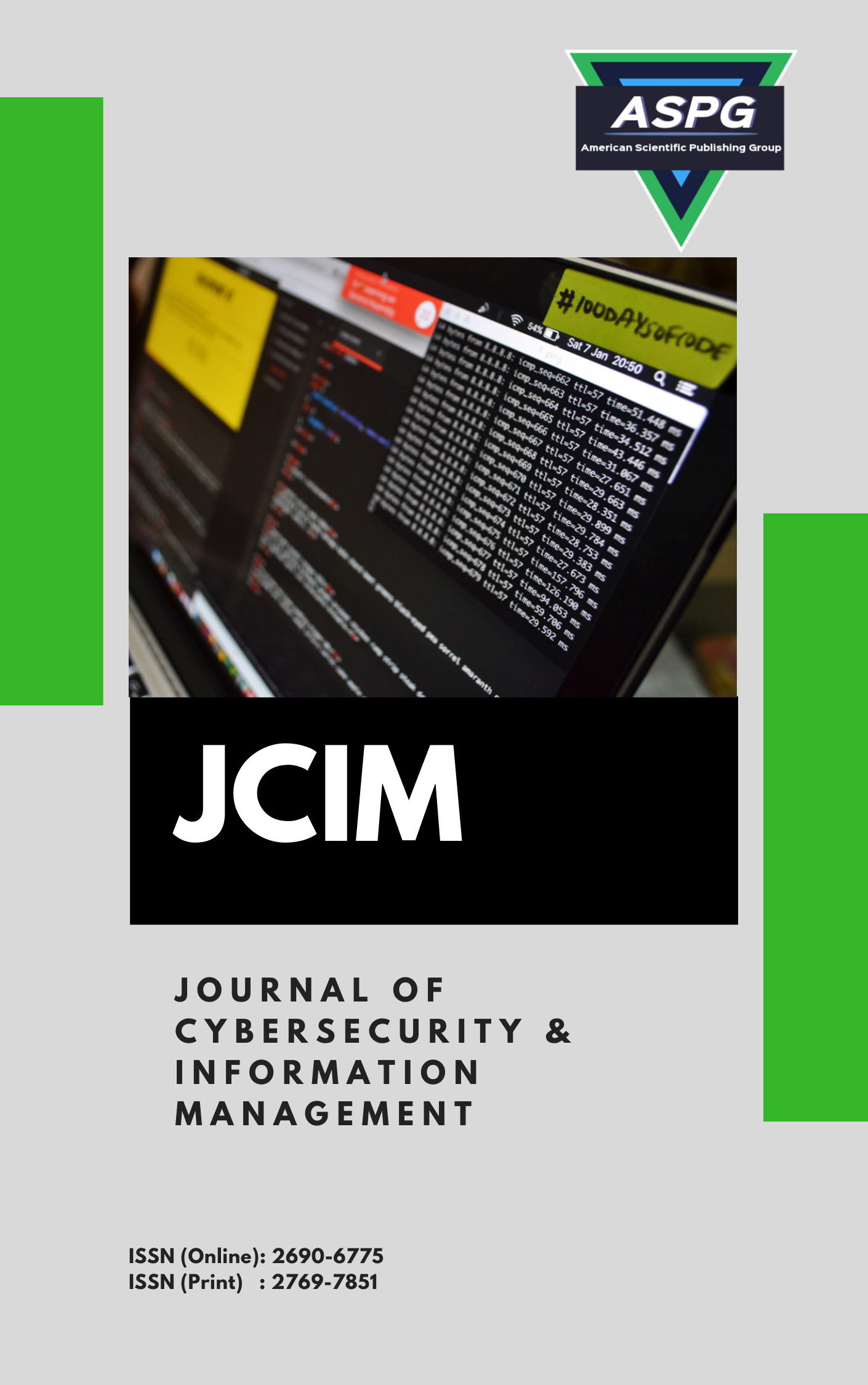

Volume 15 , Issue 1 , PP: 50-61, 2025 | Cite this article as | XML | Html | PDF | Full Length Article
P. Maheswaravenkatesh 1 , K. Nithya 2 , V. Kandasamy 3 , R. Kiruba buri 4 * , A. Sumaiya Begum 5
Doi: https://doi.org/10.54216/JCIM.150105
Ad-hoc Networks are structure less, auto-designing, self mending and dynamic in nature. The manet geography which are more helpless to have security issues and clearly self important to different kinds of assaults. The IDS framework has been created in manet to address the different assaults in Ad-hoc networks. Irregularity interruption recognition is bothered with ready to distinguishing occasions that give off an impression of being confused assaults. In contrast to single and gathering of nodes, causes assaults may cause all the more destroying impacts on remote conditions. To guard against different shared assaults. In this paper, we propose 'An Intelligent IDS for mobile adhoc network using Differential Evolutionary and Navie Bayesian algorithm (DEANB)‘ calculation. The proposed framework is for the most part centers to identify and forestall the malevolent node in Ad-hoc organizes and arrange the believed node utilizing the NB idea and node choice is upgraded utilizing DE calculation. This proposed framework which likewise diminishes the bogus positive pace of Ad-hoc nodes and expands the reliability of the node took part in dynamic systems. The proposed framework can identify wormhole, dark opening, flooding and specific bundle drop and furthermore builds the exhibition of system as far as various boundaries like throughput, directing over-head, start to finish postponement and packet conveyance proportion, and so forth. In this way the recreations in NS-2 shows that the proposed framework has impressively diminishes the vindictive trouble making of nodes in networks.
IDS&ndash , Intrusion Detection System , DPS- Detection and Prevention system node , DE- Differential Evolutionary , Adhoc Networks , NB &ndash , Naï , ve Bayesian ,
[1] Tiranuch Anantvalee, Jie Wu, Wireless/Mobile Network Security, A survey on Intrusion Detection in Mobile Ad Hoc Networks, Springer, 2006, pp. 170-196.
[2] Kondaiah, R., & Sathyanarayana, B. (2018). Trust factor and fuzzy-firefly integrated particle swarm optimization based intrusion detection and prevention system for secure routing of MANET. International Journal of Computer Sciences and Engineering, 10(1), 13-33.
[3] Letou, K., Devi, D., & Singh, Y. J. (2013). Host-based intrusion detection and prevention system (HIDPS). International Journal of Computer Applications, 69(26), 28-33.
[4] Raza, N., Aftab, M. U., Akbar, M. Q., Ashraf, O., & Irfan, M. (2016). Mobile ad-hoc networks applications and its challenges. Communications and Network, 8(3), 131-136.
[5] M. Sailaja, R. Kiran Kumar, P. Sita Rama Murty, Intrusion Detection Model based on Differential Evolution, International Journal of Computer Applications, Vol. 36, No.6, December 2011.
[6] Zhehuang Huang and Yidong Chen, An Improved Differential Evolution Algorithm Based on Adaptive Parameter, Hindawi Publishing Corporation, Article ID 462706.
[7] S.Saravanan, R M. Chandrasekaran, Intrusion Detection System using Bayesian Approach, International Journal of Engineering and Innovative Technology, Vol. 4, Iss. 7, 2015.
[8] Basant Subba, Santosh Biswas, Sushanta Karmakar, Intrusion detection in Mobile Ad-hoc Networks: Bayesian game formulation, Engineering Science and Technology, An International Journal 19(2016) 782-799.
[9] Arathy K S, Sminesh C N, A Novel Approach for Detection of Single and Collaborative Black Hole Attacks in MANET, Procedia Technology, 25 (2016), 264 – 271.
[10] Khan.F.A, M.Imran, Haider Abbas, A Detection and Prevention System against Collaborative Attacks in Mobile Ad hoc Networks,Elsevier Future Generation Computer Systems , March 2017, Volume 68.
[11] Opinder singh, Jatinder singh and Ravinder singh, An Intelligent Intrusion Detection and Prevention system for Safeguard MANET against Malicious node, Indian Journal of Science and Technology, vol. 10(14), April 2017.
[12] Ramireddy Kondaiah and Bachala Sathyanarayana, Trust Factor And Fuzzy-Firefly Integrated Particle Swarm Optimization Based Intrusion Detection and Prevention System for Secure Routing of Manet, International Journal of Computer Networks & Communications, Vol.10, No.1, January 2018.
[13] Ephantus Mwangi, Geoffrey Muketha, Kamau, Optimized Trust-Based DSR Protocol to Curb Cooperative Blackhole Attacks in MANETs Using NS-3, International Journal of Networks and Communications, 10(1), 10-19.
[14] Vishnu Balan E, Priyan M K, Gokulnath C, Prof.Usha Devi G, Fuzzy Based Intrusion Detection Systems in MANET, Procedia Computer Science 50 ( 2015 ) 109 – 114, 2015.
[15] Elamparithi. P, K. Ruba Soundar, Trusted Sensing Model for Mobile Ad HoC Network using Differential Evolution Algorithm, ITC 4/49 Information Technology and Control, vol. 49, No. 4, pp. 556-563, 2020.
[16] Ephantus Mwangi, Geoffrey Muketha, Kamau, Optimized Trust-Based DSR Protocol to Curb Cooperative Blackhole Attacks in MANETs Using NS-3, International Journal of Networks and Communications, 10(1), 10-19.
[17] J. J. Liang, B. Zheng, F. Y. Xu, B. Y. Qu, H. Song, Multi-objective Differential Evolution Algorithm Based on Fast Sorting and a Novel Constraints Handling Technique, IEEE Congress on Evolutionary Computation (CEC), 2014, DOI: 10.1109/CEC.2014.6900525
[18] T. Jayasankar , R. Kirubaburi, Intelligence intrusion detection using PSO with decision tree algorithm for adhoc networks, Bioscience Biotechnology Research Communications 12(2):27-34, May 2019.